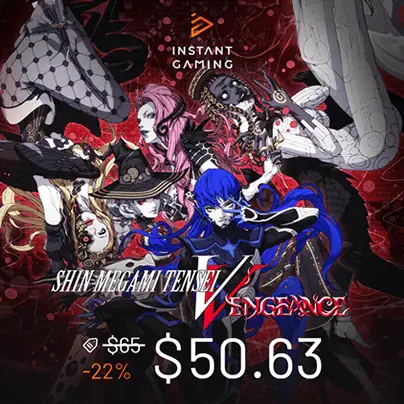Every so often, a new game hits our digital shelves that surprises us with its innovation. Whether this is some touching up of a familiar roguelike mechanic or an entirely new feature in a 4X, it reinvigorates our interest in the genre. It’s this “soul” of a game that can elevate an unknown indie to Steam’s Popular New Releases list as it draws in a crowd of players that has grown accustomed to seeing too much of the same.
Shadows of Forbidden Gods is the most recent of these for me. After glancing over its store page it seemed like an interesting enough concept even in its current Early Access state, so I pulled the trigger and picked it up. I can emphatically state that I was not disappointed.
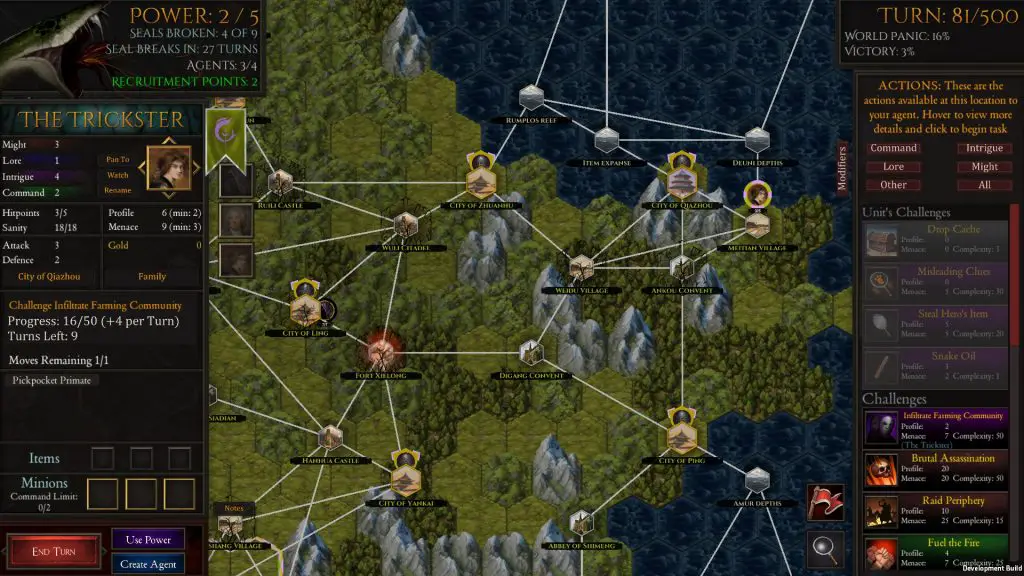
A Dark God Rises
Shadows of Forbidden Gods is set in a fantasy medieval world complete with elves, orcs, magic, and so on. Its worlds are made up of many factions with hierarchies that guide their internal politics and interpersonal relations that drive their external ones. Religions spread across these lands guide the actions of their followers while a number of exceptional heroes travel these territories in the hopes of making the world a better place, serving the interests of their factions, or maybe just filling their pockets with gold. Most importantly, however, is that there is a sleeping elder god that has begun the process of waking up. This is you.
There are currently six elder gods available to play and there are likely to be more in the future as we’ve only just hit 1.0 within a week of this writing. They come in a variety of flavors with each of them vastly changing how you’ll end up playing your run. She Who Will Feast is a giant snake who is the most versatile of the elder gods and can be used with success moving toward any of the victory conditions.
Iastur, the Laughing King, plays heavily into the madness mechanic and is able to add and remove personality traits of heroes and rulers. This is especially true when one of his agents has planted his cursed tome on an unsuspecting character. Vinerva is plant-themed, growing magnificent trees and bushes that bestow gifts upon those who would partake of them, though this choice will come with a great cost when the elder god comes calling. Ophanim, the Divine Beyond, converts the masses to his faith while appearing as an angel and is capable of forming theocracies to serve his will to convert or purge non-believers forcefully.
Mammon, Wealth of the Mountain, plays to mankind’s avarice, gifting and collecting gold while turning them against one another with their greed. Last but not least, we have the Cordyceps Hive Mind which spawns insects and uses pheromones to control their actions. The humans that they slay are then used as nests and breeding grounds to further produce more larva in what can be a devastating and terrifying snowball effect of death that spreads across the land.
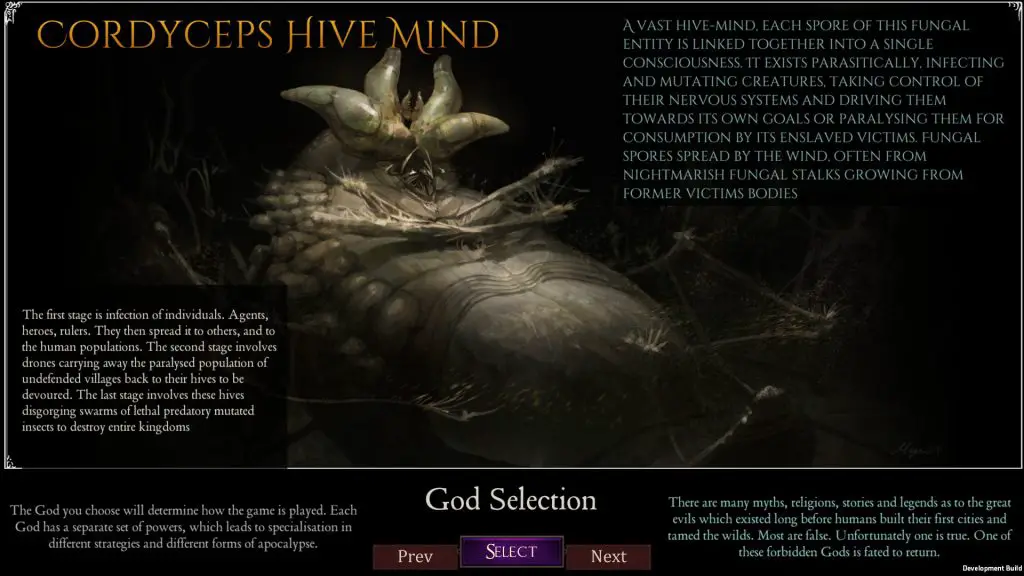
MELTING POT OF PERSONALITIES
To truly understand the mechanics at play in Shadows of Forbidden Gods, we must first understand how the individuals that populate the world live their lives. Agents and heroes are two sides of the same coin; the former serves the interests of the dark god, while heroes are generally opposed to it. Each of these is broken up into a number of attributes, including might, lore, intrigue, command, hitpoints, sanity, profile, and menace.
Might, lore, intrigue, and command are primarily used to determine how talented the character is at performing in a category from the long list of actions available. One that has a high might is skilled at tasks like raiding a settlement while one with an exceptional intrigue is capable of quickly infiltrating a society.
Hitpoints determine how much harm a character can endure before their existence comes to an end, while sanity represents how much mental anguish they can endure before they fall into madness. Profile is how well-known the individual is, which directly impacts how visible they are to the forces opposed to the elder god, while menace is how much of an evil threat they are seen to be. Profile and menace work hand in hand when heroes are determining which threats need to be dealt with.
On the other hand, rulers remain in settlements as opposed to adventuring across the wilds. They are not as directly involved in quests and conflicts, though their impact is felt just as strongly through the politics, laws, and decrees that they are engaged in. As with heroes, the choices that rulers make are based on the likes and dislikes that make up their personalities. An ambitious ruler is more likely to start a civil war against their liege or invade their neighbor with conquest in mind, while one that likes cooperation is more likely to fund heroes and form alliances.
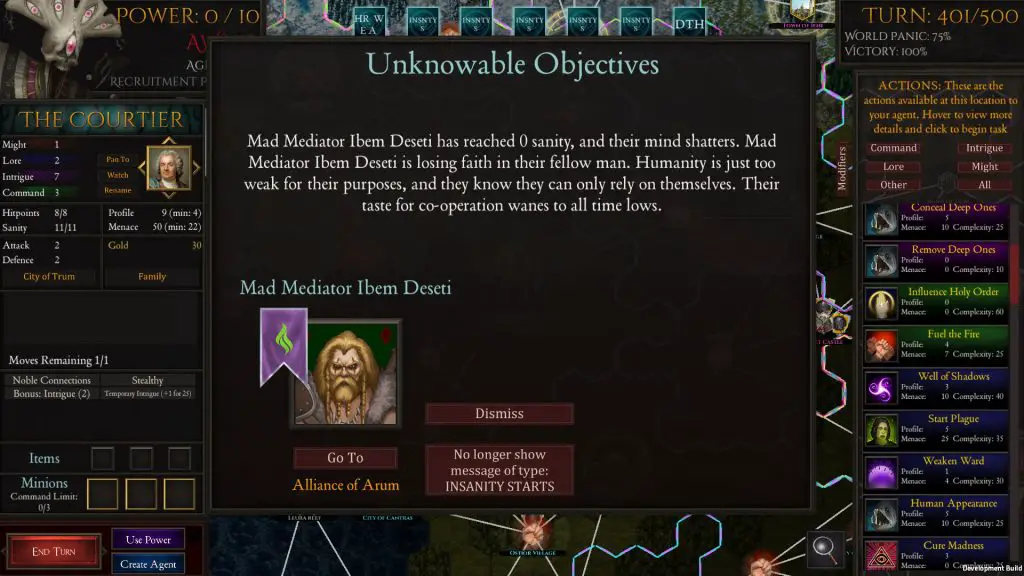
NAMELESS FARMERS AND BLOODTHIRSTY ORCS
While the named characters impact the world a great deal, the locations that cover the world are just as important to your story. The factions that hold these locations will be running them according to their interests and your eldritch influence is held over only one individual known as the Supplicant. They and your other agents are the way that you change the world to your vision.
Rural villages are easily infiltrated and enshadowed, weakening the security of the more fortified and protected cities nearby, especially if the smaller settlement serves as a primary food source and they are cut off from it. Sewers can be infiltrated to spread plague and recruit rats to your cause, libraries hold arcane secrets that can be studied to learn magical spells, holy sites can be corrupted against those they once inspired and protected, docks provide access to maritime trade routes and a way to encourage the growth of a Deep One civilization, and so on. Many other locations can be shifted to your advantage once you’ve infiltrated and enshadowed them (or converted in the case of one of the elder gods), and multiple strategies toward overcoming the forces of good.
Rulers and heroes can be corrupted to serve you over time, though other factions are out there waiting to be enshadowed or created if you so choose. The Deep Ones, as mentioned above, are fishmen that live in the deeps, and your agents have the capability to form and grow cults dedicated to them in coastal settlements.
After significant investment, this cult will overtake the settlement itself and establish itself as a faction, spreading its influence and acting against those who fight against your interests. Orcish hordes have territories of their own and often fight against nearby humans and elves, though they can be subdued to serve you directly as well. A strong agent can establish themselves as the master of the horde and not only guide its destructive tendencies but also significantly upgrade the economy that determines its size and power.
A Dark Empire is also formable, where you have successfully corrupted a formerly human nation and you can name your own monarch to take its reigns. This monarch has the capability to guide the empire to your whims, expanding and carrying out your orders. These are a few of the allies you can collect if you so choose, though I won’t spoil all of the factions that can be discovered here.
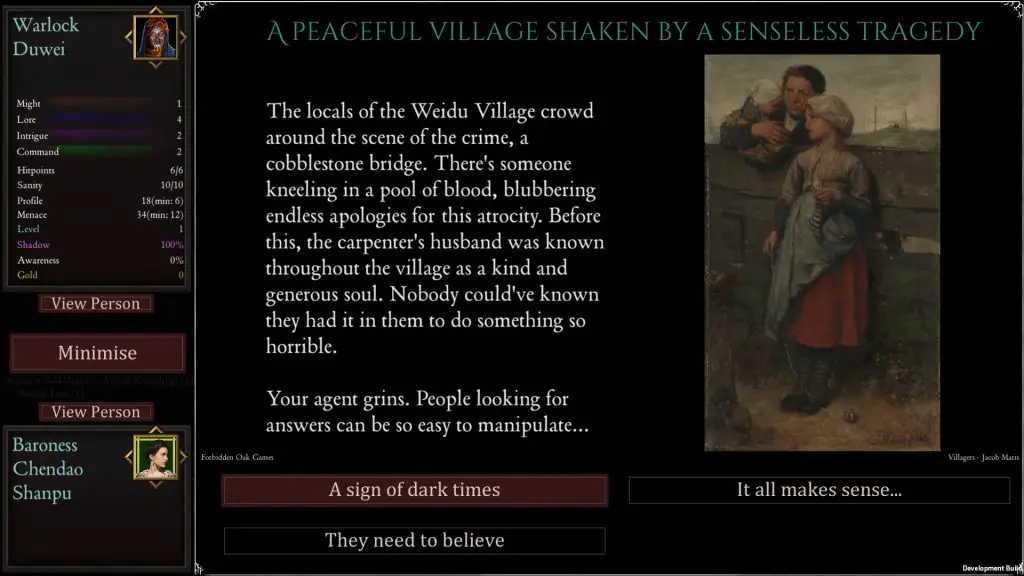
THE BOTTOM LINE
Shadows of Forbidden Gods is one of the best games that I’ve played this year. It acknowledges and embraces that there are many ways to bring the world to heel and offers the player many tools to devise their own strategies. The Elder Gods vary wildly from one to the next with unique powers that make them each their own experience.
Individual rulers who act on their own interests with or without the influence of the Elder Gods bring life to the world, and it’s always satisfying to see these pursued interests become increasingly harsh thanks to your own plans coming to light. The incredible amount of detail that went into the long lists of actions that your agents can carry out at any location adds to the thrill; no two games are ever the same.
I highly recommend Shadows of Forbidden Gods to anyone interested in strategy games, playing the villain in a dark setting, and those who enjoy being part of a world that carries on with or without interference by the player. There are only a pair of disclaimers I would bring to the discussion for those who might not be interested in this title, and it would firstly be that the graphics are quite basic; those who are seeking to push their graphics cards to their limit aren’t going to do so here.
Secondly, your agents and elder powers are your only direct control methods. You’ll always be busy, but you’ll often be seeing the pieces that you’ve put into motion carrying out your will as opposed to directly controlling marching armies and the like. That said, I was more than impressed by this title, and I look forward to not only my next game but where further development will take it in the future.

